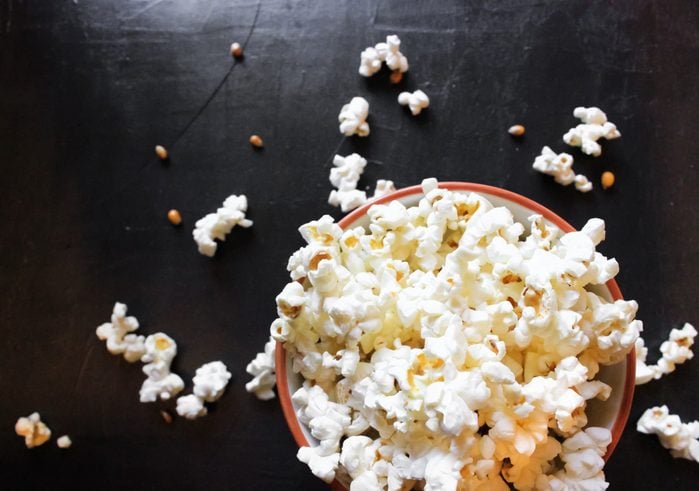
Popcorn could be the perfect healthy snack
When you wonder: “Is popcorn healthy?” you have to narrow down the type of popcorn you’re munching on. If it’s air-popped popcorn—not the fatty, butter-drenched stuff you get at the movies—then you’ll be happy about the answer. Read on to learn more about why air-popped popcorn is actually a healthy snack option, and why you can add it to your list of healthy snacks for adults.
Get The Healthy @Reader’s Digest newsletter

It has few calories—if you pop it the right way
The healthiest type of popcorn is air-popped, which only has 30 calories per cup. Meanwhile, the Center for Science in the Public Interest found that the medium and large popcorn sizes at Regal theaters each had 1,200 calories and 60 grams of saturated fat. A large popcorn at AMC wasn’t much better: 1,030 calories and 57 grams of saturated fat. At home, you can use a hot air popper, like this Cuisinart Hot Air Popcorn Maker or Colonel Popper Microwave Popcorn Popper Bowl to make your own.

Popcorn could be healthier than fruits and vegetables
Yep, you read that right. According to a 2019 analysis in the journal Antioxidants, popcorn is loaded with polyphenols, compounds found in plants that act as antioxidants and reduce inflammation. Polyphenols are heavily diluted in fruits and vegetables, which are 90% water. Yet popcorn is made up of about 4% water, so the polyphenols are more highly concentrated, especially in the hulls (the hard shells that get stuck in your teeth). One serving of popcorn can contain up to 300 mg of polyphenols, according to a prior study from the University of Scranton, which would account for 13% of the average American’s daily intake. Fruit accounts for 255 mg of polyphenols per day, and vegetables bring in about 218 mg per day. That said, popcorn doesn’t have many other vitamins and nutrients, so it can’t completely replace fruits and veggies in your diet.
Here’s the Exact Number of Fruits and Veggies You Need to Eat to Live Longer
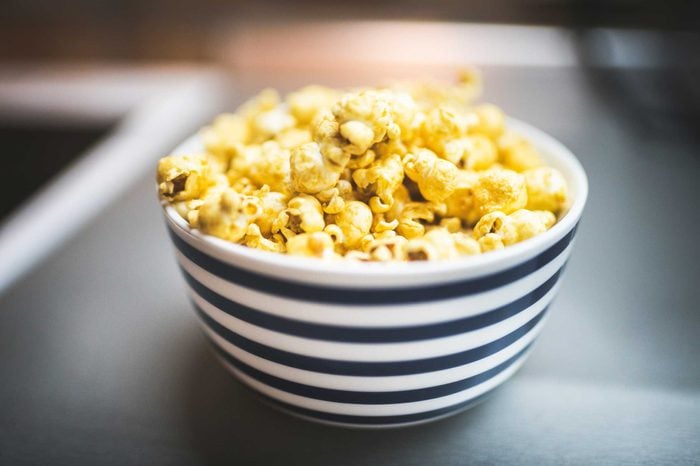
Popcorn may help fight cancer
One of the many powers of polyphenols like those found in popcorn is their ability to block enzymes that cancers need to grow and, in doing so, regulate the spread of cancerous cells, notes the American Institute for Cancer Research. The traditional way to reap these health benefits is by eating fruits and vegetables, but the high concentration of polyphenols makes eating popcorn a healthy alternative. Since they can also prevent inflammation and plaque buildup, foods rich in polyphenols may help prevent cardiovascular disease.
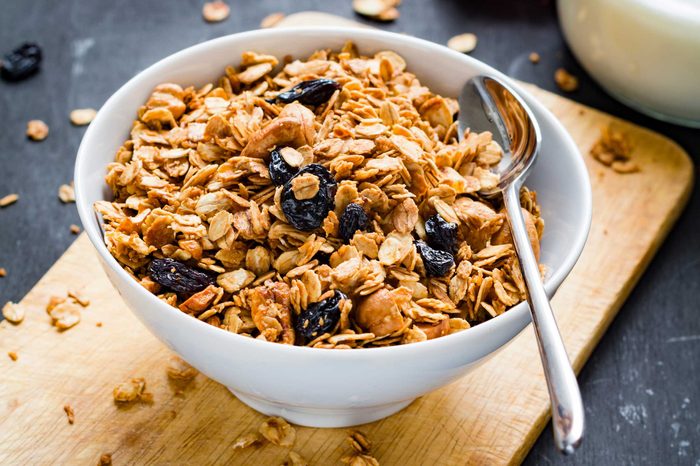
Popcorn gives you your fill of whole grain
Popcorn is one snack that is 100% unprocessed whole grain. Just one serving of popcorn such as SkinnyPop Popcorn Original contains more than 70% of the recommended daily whole grain intake.
Eating more popcorn is also one of 30 Ways to Get More Fiber in Your Diet Without Even Trying.

Popcorn may help relieve constipation
Since popcorn is all whole grain, its insoluble fiber helps keep your digestive tract in check and prevents constipation. A 3-cup serving contains 3.5 grams of fiber, and a high-fiber diet can help promote intestinal regularity, according to the Food and Drug Administration (FDA). Who knew this small snack could make such a huge impact on digestive health?
A Gastroenterologist’s Surprising Best Way to Relieve Constipation
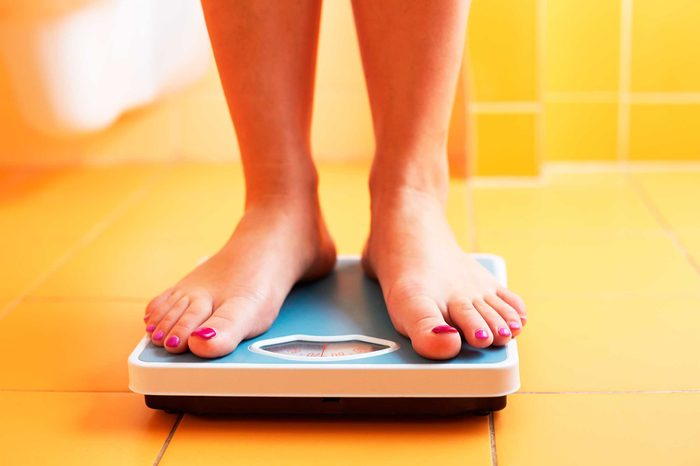
It’s the perfect dieting snack
High-fiber foods take more time to digest than non-fibrous foods, so they can keep you fuller longer. Snacking on air-popped popcorn in between meals can make you less tempted by sweets and fatty foods. Just don’t load up on butter and salt.
Sweet, Salty, Crunchy, Creamy: 49 Healthy Snacks to Satisfy Every Craving
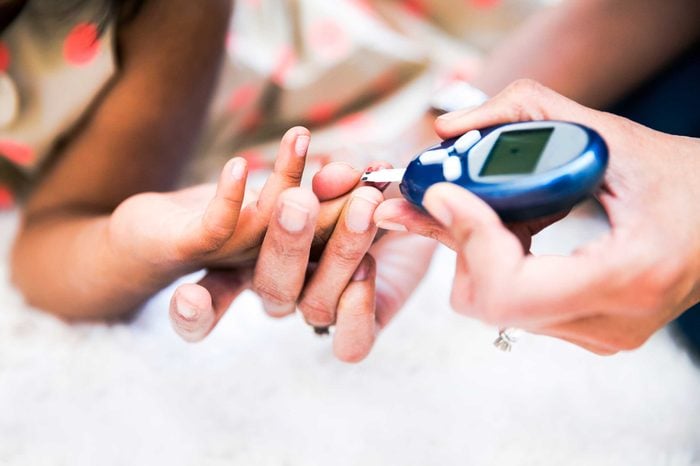
Popcorn is diabetic friendly
Even though fiber is listed on food labels under total carbohydrates, it doesn’t have the same effect on blood sugar as refined carbs like white bread. High-fiber foods don’t contain as much digestible carbohydrate, so it slows the rate of digestion and causes a more gradual and lower rise in blood sugar, according to 2015 research in the journal Circulation.

There are endless options for popcorn flavors
You can put way more on popcorn than just butter and salt. Add cinnamon or apple pie spice for a sweet treat, or go spicy with hot sauce, wasabi, or curry. You can also give your snack an Italian flair with grated Parmesan and a dash of olive oil. Basically, anything in your spice rack can add more flavor without very many calories when you’re eating popcorn. Want someone else to do the seasoning work for you? Try Cheerie Lane, which comes in flavor-packed options like Rosemary Garlic and Lemon Black Pepper. Their unique popcorn pods also have an “antioxidant-rich” cacao butter base, a heart-healthy alternative to hydrogenated oils, and uses fresh ingredients for a powerful taste.
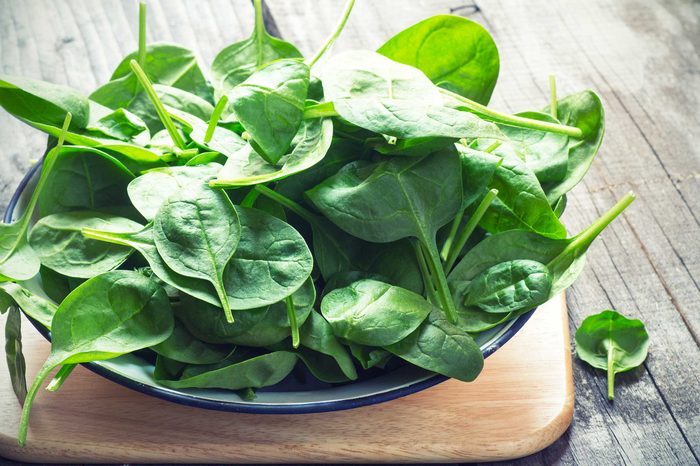
Popcorn has more iron than spinach
Not by much, but it’s true: According to the United States Department of Agriculture, 1 ounce (28 grams) of popcorn contains 0.9 mg of iron, while 1 cup of raw spinach (30 grams) has 0.8 mg. These numbers seem small, but adult men only need 8 mg of iron in their diet each day. Adult women, on the other hand, need 18 mg per day (because of the blood they lose during menstruation). Almost 10% of women are iron deficient, according to the Centers for Disease Control and Prevention. So get your fill of iron however you can.
For more wellness updates, follow The Healthy on Facebook, Instagram, and Twitter. Keep reading:

